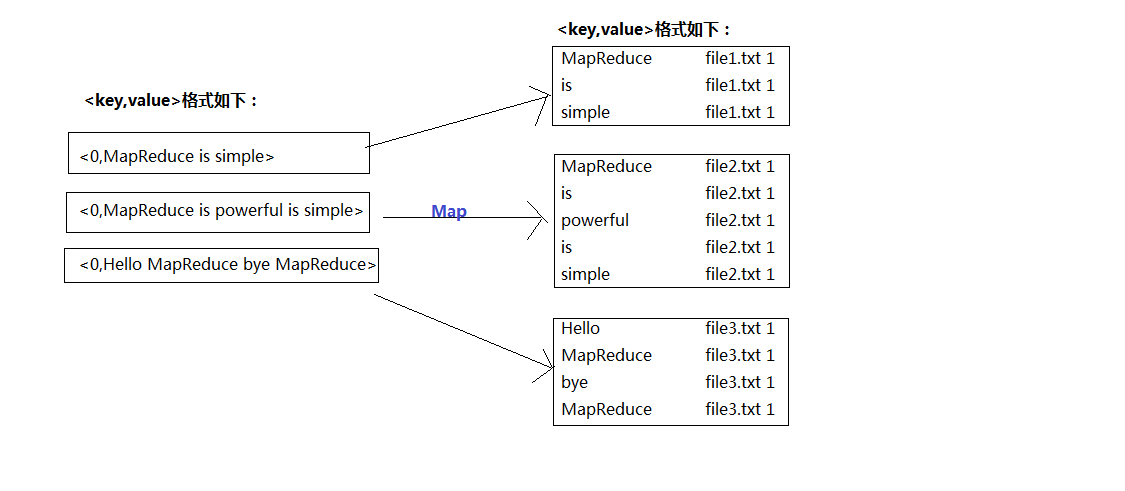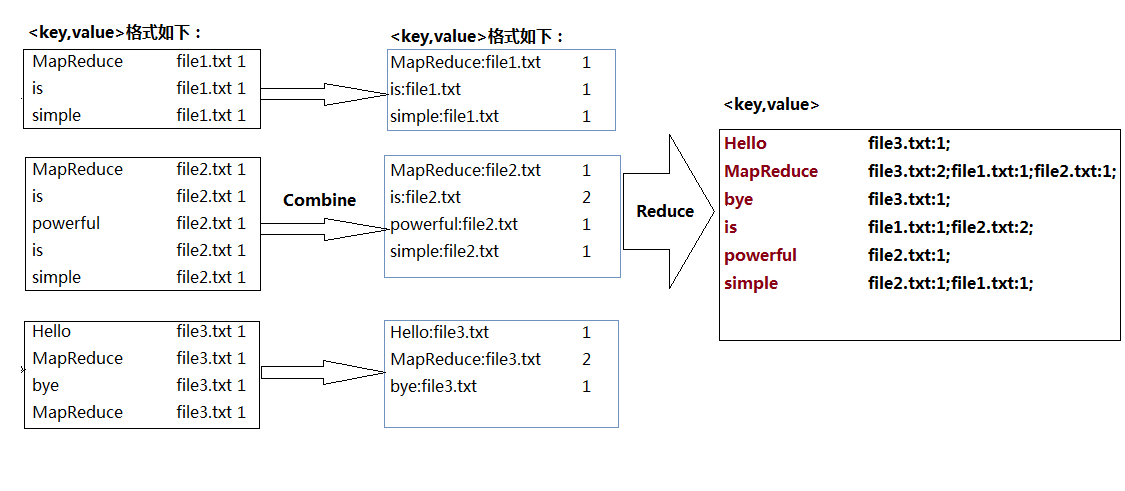Hadoop之倒排索引
前言:
从IT跨度到DT,如今的数据每天都在海量的增长。面对如此巨大的数据,如何能让搜索引擎更好的工作呢?本文作为Hadoop系列的第二篇,将介绍分布式情况下搜索引擎的基础实现,即“倒排索引”。
1.问题描述
将所有不同文件里面的关键词进行存储,并实现快速检索。下面假设有3个文件的数据如下:
file1.txt:MapReduce is simple file2.txt:mapReduce is powerful is simple file3.txt:Hello MapReduce bye MapReduce
最终应生成如下索引结果:
Hello file3.txt:1 MapReduce file3.txt:2;file2.txt:1;file1.txt:1 bye file3.txt:1 is file2.txt:2;file1.txt:1 powerful file2.txt:1 simple file2.txt:1;file1.txt:1
--------------------------------------------------------
2.设计
首先,我们对读入的数据利用Map操作进行预处理,如图1:

对比之前的单词计数(WorldCount.java),要实现倒排索引单靠Map和Reduce操作明显无法完成,因此中间我们加入'Combine',即合并操作;具体如图2:
--------------------------------------------------------------
3.代码实现
1 package pro; 2 3 import java.io.IOException; 4 import java.util.StringTokenizer; 5 import org.apache.hadoop.conf.Configuration; 6 import org.apache.hadoop.fs.Path; 7 import org.apache.hadoop.io.IntWritable; 8 import org.apache.hadoop.io.Text; 9 import org.apache.hadoop.mapreduce.Job; 10 import org.apache.hadoop.mapreduce.Mapper; 11 import org.apache.hadoop.mapreduce.Reducer; 12 import org.apache.hadoop.mapreduce.lib.input.FileInputFormat; 13 import org.apache.hadoop.mapreduce.lib.input.FileSplit; 14 import org.apache.hadoop.mapreduce.lib.output.FileOutputFormat; 15 import org.apache.hadoop.util.GenericOptionsParser; 16 17 public class InvertedIndex { 18 final static String INPUT_PATH = "hdfs://hadoop0:9000/index_in"; 19 final static String OUTPUT_PATH = "hdfs://hadoop0:9000/index_out"; 20 21 public static class Map extends Mapper<Object, Text, Text, Text> { 22 23 private Text keyInfo = new Text(); // 存储单词和URL组合 24 private Text valueInfo = new Text(); // 存储词频 25 private FileSplit split; // 存储Split对象 26 27 // 实现map函数 28 public void map(Object key, Text value, Context context) 29 throws IOException, InterruptedException { 30 // 获得<key,value>对所属的FileSplit对象 31 split = (FileSplit) context.getInputSplit(); 32 StringTokenizer itr = new StringTokenizer(value.toString()); 33 while (itr.hasMoreTokens()) { 34 35 // 只获取文件的名称。 36 int splitIndex = split.getPath().toString().indexOf("file"); 37 keyInfo.set(itr.nextToken() + ":" 38 + split.getPath().toString().substring(splitIndex)); 39 // 词频初始化为1 40 valueInfo.set("1"); 41 context.write(keyInfo, valueInfo); 42 } 43 } 44 } 45 46 public static class Combine extends Reducer<Text, Text, Text, Text> { 47 private Text info = new Text(); 48 49 // 实现reduce函数 50 public void reduce(Text key, Iterable<Text> values, Context context) 51 throws IOException, InterruptedException { 52 // 统计词频 53 int sum = 0; 54 for (Text value : values) { 55 sum += Integer.parseInt(value.toString()); 56 } 57 58 int splitIndex = key.toString().indexOf(":"); 59 // 重新设置value值由URL和词频组成 60 info.set(key.toString().substring(splitIndex + 1) + ":" + sum); 61 // 重新设置key值为单词 62 key.set(key.toString().substring(0, splitIndex)); 63 context.write(key, info); 64 } 65 } 66 67 public static class Reduce extends Reducer<Text, Text, Text, Text> { 68 private Text result = new Text(); 69 70 // 实现reduce函数 71 public void reduce(Text key, Iterable<Text> values, Context context) 72 throws IOException, InterruptedException { 73 // 生成文档列表 74 String fileList = new String(); 75 for (Text value : values) { 76 fileList += value.toString() + ";"; 77 } 78 result.set(fileList); 79 80 context.write(key, result); 81 } 82 } 83 84 public static void main(String[] args) throws Exception { 85 86 Configuration conf = new Configuration(); 87 88 Job job = new Job(conf, "Inverted Index"); 89 job.setJarByClass(InvertedIndex.class); 90 91 // 设置Map、Combine和Reduce处理类 92 job.setMapperClass(Map.class); 93 job.setCombinerClass(Combine.class); 94 job.setReducerClass(Reduce.class); 95 96 // 设置Map输出类型 97 job.setMapOutputKeyClass(Text.class); 98 job.setMapOutputValueClass(Text.class); 99 100 // 设置Reduce输出类型 101 job.setOutputKeyClass(Text.class); 102 job.setOutputValueClass(Text.class); 103 104 // 设置输入和输出目录 105 FileInputFormat.addInputPath(job, new Path(INPUT_PATH)); 106 FileOutputFormat.setOutputPath(job, new Path(OUTPUT_PATH)); 107 System.exit(job.waitForCompletion(true) ? 0 : 1); 108 } 109 }
4.测试结果
Hello file3.txt:1; MapReduce file3.txt:2;file1.txt:1;file2.txt:1; bye file3.txt:1; is file1.txt:1;file2.txt:2; powerful file2.txt:1; simple file2.txt:1;file1.txt:1;
Reference:
[1]Hadoop权威指南【A】Tom Wbite
[2]深入云计算·Hadoop应用开发实战详解【A】万川梅 谢正兰
--------------
结语:
从上面的Map---> Combine ----> Reduce操作过程中,我们可以体会到“倒排索引”的过程其实也就是不断组合并拆分字符串的过程,而这也就是Hadoop中MapReduce并行计算的体现。在现今的大部分企业当中,Hadoop主要应用之一就是针对日志进行处理,所以想进军大数据领域的朋友,对于Hadoop的Map/Reduce实现原理可以通过更多的实战操作加深理解。本文仅仅只是牛刀小试,对于Hadoop的深层应用本人也正在慢慢摸索~~
-------- 以上内容纯属个人学习总结,不代表任何团体或单位。若有理解不到之处请见谅!---------




